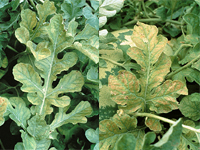People suffer from problems caused by air pollution which includes chemicals such as ozone. Plants can also be injured by air pollution including ozone. In fact, ozone damages more plants than all other air pollutants combined.
Dr. Kent Burkey at the USDA Agricultural Research Service Air Quality-Plant Growth and Development Research Unit in Raleigh, North Carolina is looking at ways that plants use vitamin C to defend themselves against pollution. One constituent of pollution, ozone, protects us from damage caused by UV if it remains in the upper atmosphere, but if ozone is too concentrated in the troposphere (at ground level), it injures us as well as plants. Ozone causes injury to plants when it enters plants and decomposes into reactive oxygen intermediates (ROIs). ROIs must be neutralized to reduce injury to plants. Burkey found that plants move vitamin C into the liquid in the spaces between their cells to increase their tolerance to ozone. Snap beans may protect themselves from ozone with vitamin C in these spaces. For more information regarding this work, review the January 2003 issue of the Agricultural Research Magazine available at: http://www.ars.usda.gov/is/AR/archive/jan03/plant0103.htm The United States Department of Agriculture website www.ars.usda.gov contains other interesting information. Click on "The Latest News from ARS" then click on "Magazine." This site also offers a section on science for kids (Sci4Kids tab) that may be helpful for teachers in K-12.

|
|
Views: Air pollutants affect and injure all species of cucurbits (melon or cucumber family), including watermelon. Watermelon and squash are the most sensitive of the cucurbits to ozone injury. The injury begins with premature chlorosis, leading to bleaching, then necrosis. Early symptoms (left) and late symptoms (right). Click images for an enlarged view and more information. |
